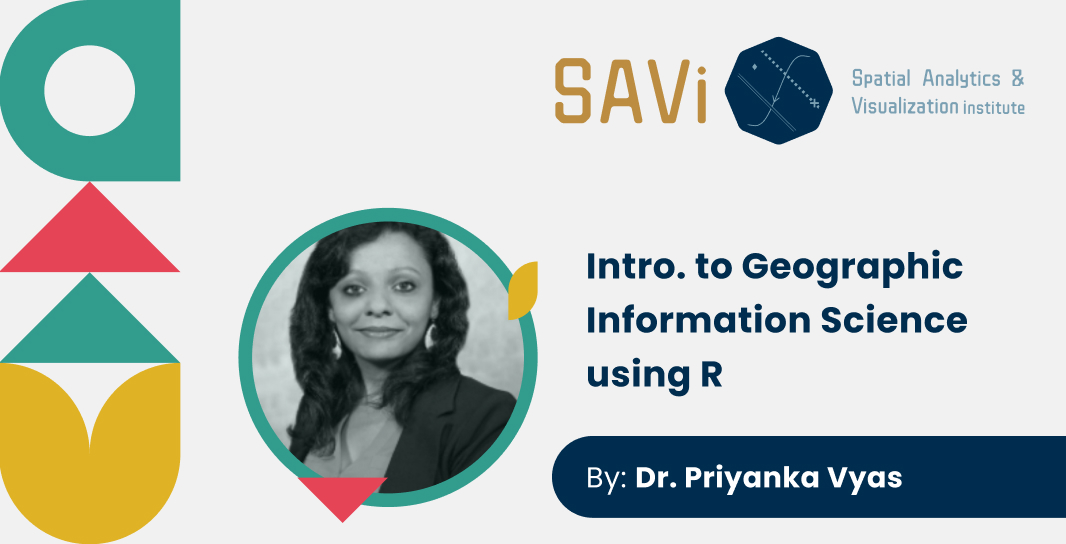Introduction to Geographic Information Science using R

Date/Time: November 12th 2022, 10:00 to 13:00
Location: Online
Instructor: Dr. Priyanka Vyas
This workshop is sponsored by the generous funding from Public Interest Technology University Network grant to provide support for educational activities focused on equitable access to technologies.
Priyanka Vyas, PhD, is a health data scientist, lecturer, and a GIS consultant. In her current role, she teaches GIS Fundamentals and Advanced GIS courses at California State University East Bay. She also supports research projects at Stanford Medical School using advanced geospatial and statistical methods. Dr. Vyas maintains a keen interest in the use of GIS to influence public policy and health policy decision-making. To that extent, she has provided support to local non-profit organizations in expanding their GIS capabilities to advance policy and advocacy. Dr. Vyas completed her postdoctoral training at the University of California, San Francisco, School of Medicine where she worked on examining the linkages between neighborhood environment and tobacco use. She has a keen interest in examining issues at the intersection of built environment and health and issues in environmental justice. She has published in leading journals such as Spatial and Spatio-Temporal Epidemiology, Preventive Medicine Reports, Asia Pacific Journal of Public Health, Journal of Health, Population, and Nutrition, among others. She has a PhD in public policy and political economy from the School of Economic, Political, and Policy Sciences at the University of Texas and Dallas and a master’s in public administration and policy from North Carolina State University. Prior to receiving her doctorate, she worked as a business reporter for a leading financial daily in New Delhi.
Workshop Description
As ‘Big Data’ has become a buzzword and GIS skills are becoming of increasing use to Data Scientists, this course will provide you with introductory skills in doing GIS analysis using R. This allows mapping in the R environment while harnessing R’s capability in data manipulation, transformation, and advanced statistical analysis. Since every software has a specific structure through which it can read the data correctly, the workshop will start with the basics of importing GIS data and data in different types of file formats such as csv in R. Next, the workshop will cover the fundamentals of the coordinate reference system in R. Without the correct coordinate
reference system, all the analysis could be wrong! Therefore, it is critical to understand map projections, how to check whether the data are in the correct coordinate reference system and how to specify the correct system for your data. After getting the spatial data in R and verifying that they are correctly projected, the workshop will cover basic mapping in R using different classification schemes. Since data manipulation and transformation forms the bedrock of GIS analysis, the workshop will cover numerous applications in how to transform raw data using
examples data sets from the San Francisco Bay Area and California. Course participants will learn how to transform string or factor data, different methods to convert numeric data to categorical data, and methods to merge spatial and attribute data.
Finally, the workshop will touch upon web-mapping in R. Ever since the onset of COVID-19, the use of interactive maps have proliferated. The workshop will demonstrate the packages and give a glimpse of creating dynamic maps and animations in R.
Learning outcomes
Upon completing this course participants will be:
Able to import spatial and attribute data in R
Export data from R into a variety of formats
Merge spatial and attribute data
Perform data manipulation and transformation
Creating factor variables
Conduct basic geoprocessing operations such as buffer, clip, intersect
Create static maps
Create web-based maps
Fees
Individual course fee:
Early bird registration (until Oct. 20, 2022): $275
Regular registration (From Oct. 21, 2022): $300
Full program fee (including all of the workshops):
Early bird registration (Until Oct. 20, 2022): $975
Regular registration (From Oct. 21, 2022): $1000